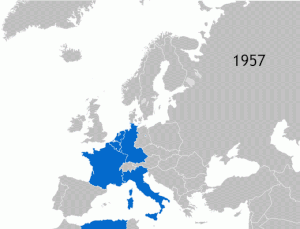
The European Union (EU) has expanded a number of times throughout its history by way of the accession of new member states to the Union. To join the EU, a state needs to fulfil economic and political conditions called the Copenhagen criteria (named after the Copenhagen summit in June 1993), which require a stable democratic government that respects the rule of law, and its corresponding freedoms and institutions. According to the Maastricht Treaty, each current member state and the European Parliament must agree to any enlargement. The process of enlargement is sometimes referred to as European integration. This term is also used to refer to the intensification of co-operation between EU member states as national governments allow for the gradual harmonisation of national laws.
The EU's predecessor, the European Economic Community,[1] was founded with the Inner Six member states in 1958, when the Treaty of Rome came into force. Since then, the EU's membership has grown to twenty-seven, with the latest member state being Croatia, which joined in July 2013. The most recent territorial enlargement of the EU was the incorporation of Mayotte in 2014. Campione d'Italia joined the EU Customs Union in 2020. The most notable territorial reductions of the EU, and its predecessors, have been the exit of Algeria upon independence in 1962, the exit of Greenland in 1985, and the withdrawal of the United Kingdom in 2020.
Accession negotiations are currently ongoing with Montenegro (since 2012), Serbia (since 2014), Albania (since 2020), North Macedonia (since 2020), Moldova (since 2024) and Ukraine (since 2024). Negotiations with Turkey were opened in October 2005,[2] but have been effectively frozen by the EU since December 2016,[3][4][5] due to backsliding in the areas of democracy, rule of law, and fundamental rights.[3][6][7]
Bosnia and Herzegovina and Georgia were granted official candidate status respectively in December 2022[8][9] and December 2023,[10] but were asked to complete additional reforms before qualifying for the formal start of membership negotiations. Kosovo submitted an application for membership in December 2022.[11] For Kosovo to be granted official candidate status, the Council will need to unanimously agree to start Kosovo's accession process by requesting an opinion from the European Commission on its application. The EU however remains divided on its policy towards Kosovo, with five EU member states not recognising its independence.
- ^ Current Article 1 of the Treaty on European Union reads:"The Union shall be founded on the present Treaty and on the Treaty on the Functioning of the European Union. Those two Treaties shall have the same legal value. The Union shall replace and succeed the European Community".
- ^ "Turkey 2006 Progress Report" (PDF). European Commission. 8 November 2006. Retrieved 15 July 2024.
- ^ a b Kempf, Danny (13 December 2016). "EU says won't expand Turkey membership talks". yahoo.com. Agence France-Presse. Archived from the original on 30 December 2019. Retrieved 21 November 2019.
- ^ "Enlargement and Stabilisation and Association process - Council conclusions (10555/18)" (PDF). Consilium. General Secretariat of the Council. 26 June 2018. Retrieved 16 July 2024.
- ^ "Council conclusions on Enlargement (16707/23)". Consilium. General Secretariat of the Council. 12 December 2023. Retrieved 13 July 2024.
- ^ Uras, Umut (20 September 2023). "Is Turkey's bid for EU membership over?". Al Jazeera. Retrieved 21 October 2023.
- ^ "Enlargement: Türkiye". Consilium. General Secretariat of the Council. 11 January 2024. Retrieved 27 June 2024.
- ^ "'Huge, historic move': EU grants Bosnia and Herzegovina Candidate Status". Sarajevo Times. 15 December 2022. Retrieved 24 December 2022.
- ^ "Enlargement: Bosnia and Herzegovina". Consilium. General Secretariat of the Council. 4 May 2024. Retrieved 27 June 2024.
- ^ "Enlargement: Georgia". Consilium. General Secretariat of the Council. 7 February 2024. Retrieved 27 June 2024.
- ^ Xhabafti, Erion; Semini, Llazar (14 December 2022). "Kosovo leaders sign application request to join EU". Associated Press. Retrieved 14 December 2022.